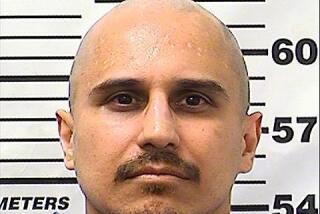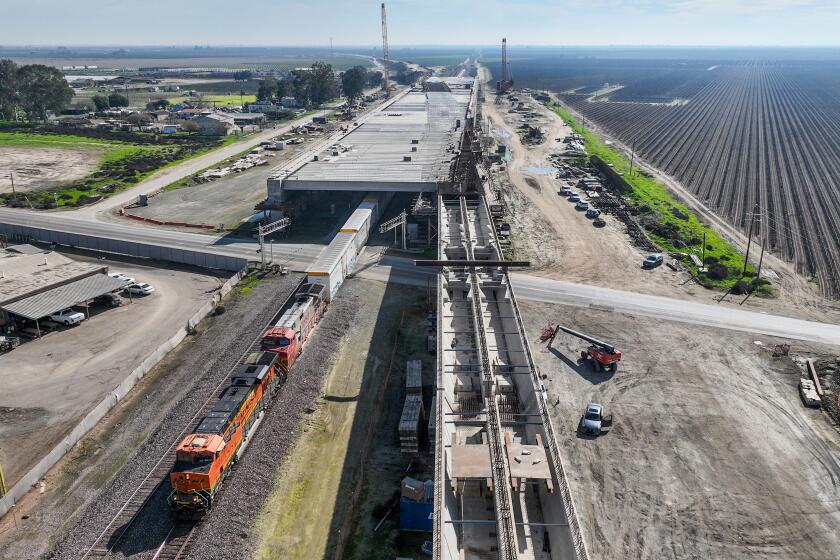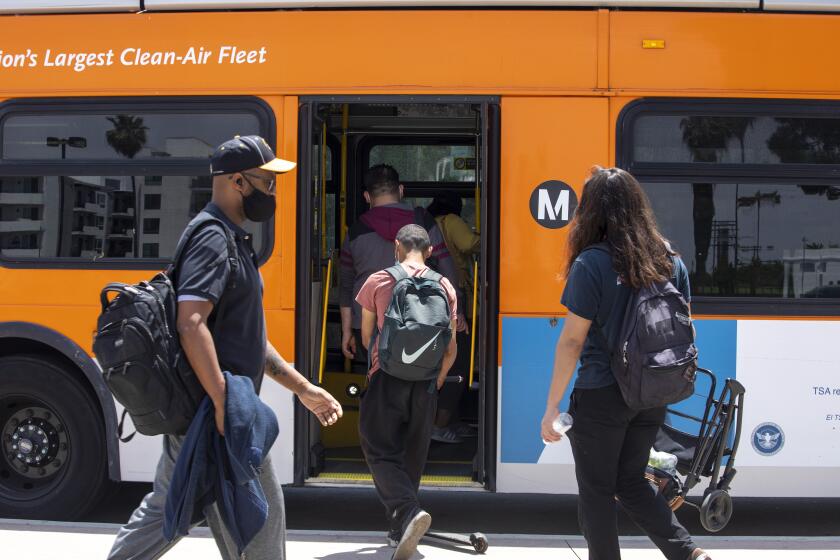The Road Gets Rockier for the RTD : Failure to Enforce Insurance Fraud Safeguard Revealed
Despite being a major target for phony injury claims, the Southern California Rapid Transit District has failed to demand compliance from its insurance adjuster with a contract provision that experts say could serve as a major safeguard against fraud.
In two different contracts negotiated over the past six years, the RTD and Leonard J. Russo Insurance Services Inc., the insurance adjuster, agreed that Russo’s staff would approve no payment without first establishing face-to-face contact with the person making the claim.
But an investigation by The Times found that the RTD has not compelled the Russo company to comply with the written provision.
The RTD has no idea--and Russo has no records to show--how often the required “eyeball” verification was made during a period when thousands of personal injury claims amounting to millions of dollars were paid out.
“There was no concerted attempt to comply with that portion of the contract, period,” said Jeff Sandford, a former senior supervisor at Russo who handled RTD claims. Sandford places much of the blame on RTD officials for poorly drafting, pricing and monitoring the Russo contract.
“It’s like nobody was minding the store,” he said.
RTD officials say nothing illegal has occurred and no district policies were violated.
However, the administering of the contract with Russo is symptomatic of what critics contend is at the heart of the transit district’s current rash of troubles--loose and inefficient management of the massive, $800-million-a-year public system.
Among the troubles have been revelations of high employee absenteeism, soaring administrative costs, employees--including drivers--using drugs, questionable travel and entertainment by RTD executives and inadequate bus driver training and hiring practices.
Adding to the controversy has been the disclosure that the district attorney’s office is investigating allegations that hundreds of thousands of dollars in fraudulent insurance claims may have been paid by the RTD. Though not directly pertinent to lax enforcement of the “eyeball” provision, RTD and Russo acknowledge that the case reflects a continuing problem of combatting fraud in the huge volume of injury claims filed against the transit agency.
Nonetheless, RTD and Russo officials say an informal, oral “interpretation” of the Russo contract has allowed the adjusting firm to disregard the contractual obligation to ensure that personal contact is made before a claimant receives a check.
In practice, Russo staff is required to meet with or otherwise personally verify the existence of claimants only when it is “practical.” That kind of amendment, by reducing time and attention to claims, probably made the contract more profitable for Russo, according to some industry analysts.
Barbara Akk, who took over as the RTD’s risk manager last year and oversees the Russo contract, was not even aware of the original contract language or verbal change when first interviewed by The Times.
After researching RTD’s handling of the matter, Akk said, “The bottom line is it’s sloppy work.”
Among other things, Akk said, she is trying to find out why the departure from contract language was not addressed by auditors hired by the RTD to review Russo’s performance. The most recent audit gave the Russo firm high marks for performance, including investigation of claims.
Akk expressed concern that she has no way of determining if the Russo firm is complying with the “when practical” version of face-to-face meetings with claimants.
Last week, she ordered Russo officials to begin documenting meetings with claimants and report them monthly. Also, she said the question of personal contact with claimants will be added to a list of practices she wants evaluated in an upcoming Russo audit.
Insurance industry officials and fraud investigators say the more personal contact insurance adjusters at the RTD and elsewhere have with those filing injury claims, the greater the chances of discouraging bogus claims.
“(In) many of the insurance frauds we see, the claimants don’t exist in the first place,” said Ronald Warthen, chief investigator for the fraud bureau of the state Department of Insurance. “There is no question in situations where you have make-believe claimants” that a requirement like that in the RTD contract, while costly, would cut down on fraud, he said.
Sandford, the former Russo claims supervisor, said he believes that claims filed on behalf of non-existent people are a significant problem for the RTD.
However, Russo and RTD officials say there is no way to determine whether the district’s failure to insist on complete verification facilitated acts of fraud.
Seeing all claimants before they get checks would be difficult and expensive, but Sandford said he believes that it could reduce payouts for bodily injury claims by 10% or more.
The RTD, which is self-insured through a large reserve fund set aside for claims, handled about 6,500 claims for personal injury and property damage last year and paid $21 million in settlements.
Just how aggressively the Russo firm has attempted to have face-to-face contact with claimants is an open question.
Leonard J. Russo, president of the firm, agreed that personally contacting claimants is important and said his staff sees many of them.
“I think we’ve been fairly aggressive in the past. . . . We try to do it as best we can,” he said.
But RTD’s most recent audit of Russo described the adjusters who handle the large volume of smaller, less serious claims--the type insurance investigators say pose the greatest problem with fraud--as “basically a telephone adjusting unit.”
In addition, Sandford, who oversaw RTD claims for five years at Russo, said a very small percentage of claimants were seen before settlement. Most of the adjusting work was done by mail and telephone, he said, and field investigators were usually busy with other tasks.
Russo said he realized that the personal contact requirement was an important part of the agreement when he first signed it in 1980.
“We intended to perform all (requirements),” he said.
But only a few months later, Russo said, he concluded that the requirement was impractical, in part because attorneys representing claimants were not cooperating with his staff. He approached F. Frederick Pollock, the former RTD administrator of the contract, about the problem.
RTD officials said that Pollock agreed that the contract language posed a problem and told Russo officials that they only had to contact claimants when it was practical. Pollock is on a long-term leave for illness and could not be reached for comment.
Akk said such a change, in her view, should be documented in writing. But RTD attorneys said Pollock acted within his authority and no written amendment was necessarily required.
RTD board member Nikolas Patsaouras said he was “disappointed” at the handling of the matter.
“Management has the responsibility to oversee that terms of contracts are met,” he said.
If the staff believed the contract needed altering, “documentation should have been required so there is no question and we’re not relying on one person’s word,” Patsaouras said.
Records show that in a second contract negotiated in 1983, the RTD again sought, and Russo again agreed to in writing, that his staff would have “eyeball” contact with all claimants who receive injury settlements.
Russo and RTD officials now say that language should not have been in the 1983 contract, which is still in effect today. Russo offered one explanation for the error, saying the “environment (at RTD) was much different in 1983 than it is today . . . it was less formal.”
Sources familiar with the claims industry said they are not surprised that Russo wanted an amendment to the requirement for personal contact in all claims cases.
Russo had agreed to handle the huge volume of claims work for a fixed price. This year’s contract price is $1.9 million.
“The more time Russo spends on each individual claim, the less money he makes,” said Ozro D. Gould, risk manager for the AC Transit system in the Oakland area.
The financial incentive for outside claims-handling firms “is to do as little investigation as necessary to get the damn claim closed,” said Gould, who settles his agency’s claims with an inside staff of transit district employees. AC Transit handles only about half the volume of liability claims that the RTD does, but Gould said through an aggressive program of personal contact, his department sees about nine out of 10 claimants who get payments.
Russo denies that concerns about staffing or profits were the motivation for seeking the change.
“We had the staff to do it . . . the problem is on the practical side when you try to do it and find all kinds of difficulties and obstructions,” he said.
Russo’s current contract expires in July. Akk, who said she agrees with requiring as much personal contact with claimants as possible, said she intends to set new, measurable standards for accomplishing that.
More to Read
Start your day right
Sign up for Essential California for news, features and recommendations from the L.A. Times and beyond in your inbox six days a week.
You may occasionally receive promotional content from the Los Angeles Times.






